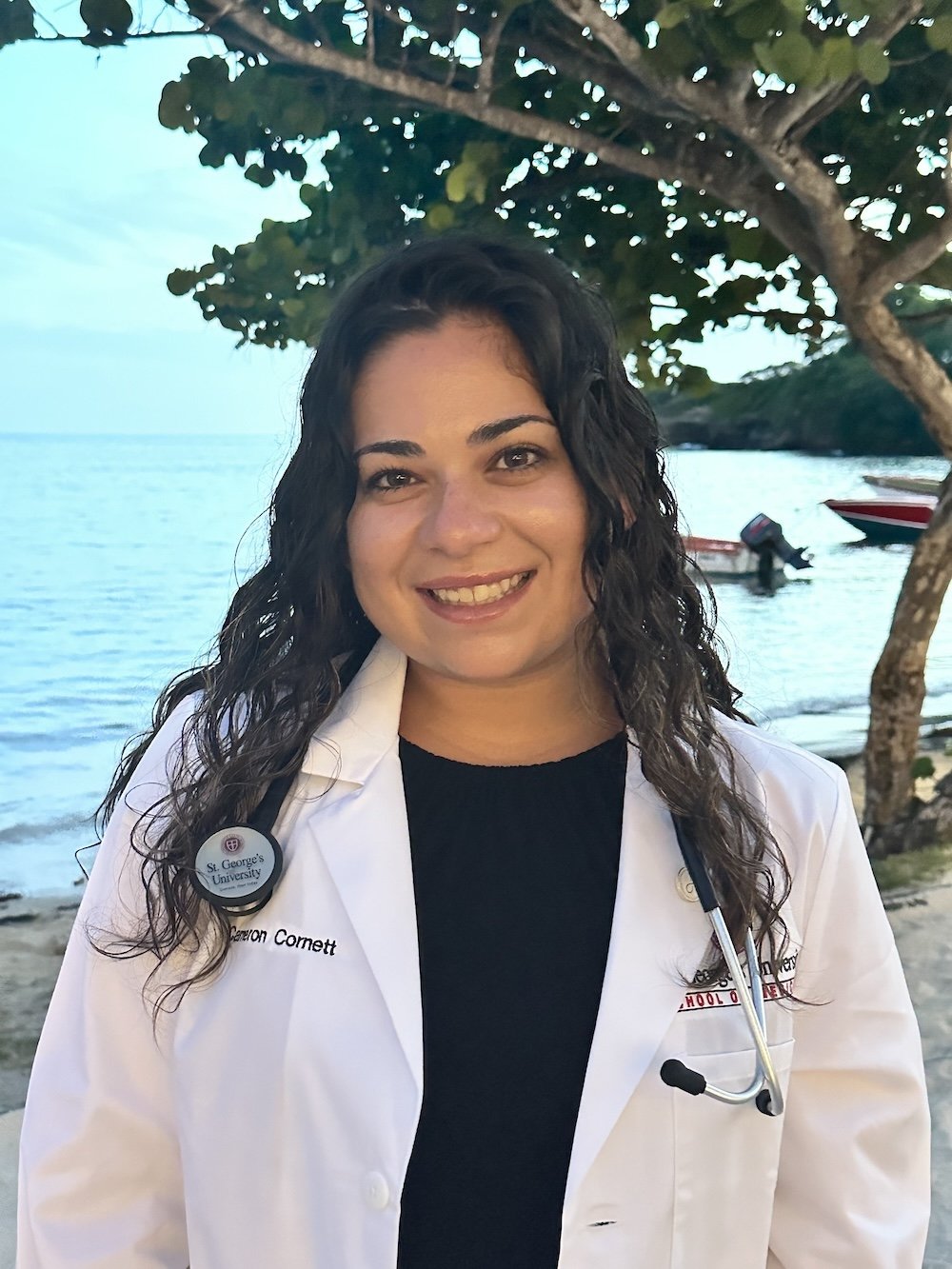Cameron C.
If you're reading this, know it’s okay to have tough days and to continue questioning why you chose medical practice, especially on this rigorous journey.
I have found myself contemplating this very debate, particularly after feeling the exhaustion of preparing for an exam or spending hours researching one of the ten pathologies I learned about in lecture that day. It’s easy to feel overwhelmed by the workload and pressure, and in those moments, it can be hard to remember why you started. But it's important to give yourself grace and recognize that these tough moments are part of the process, and they don’t define your entire journey.
The key to navigating this contemplation is grounding yourself and finding your reason why. For me, it’s about doing it for all of my future patients—being able to make a real difference in people’s lives and contribute to their well-being. Volunteering in the community with the NAS student organization allows me to interact with children of all different backgrounds, while working at the AMSA student-led health fairs allows me to spread health awareness to the local community and start making my impact. Participating in these activities fuels my passion and reminds me of why I’m pursuing this path. It’s my reason to go back to school every day and push through the challenges to finish my education to become a doctor. My dad has always told me, and continues to tell me to this day, "If it were easy, then everyone would be a doctor." This is a statement I have come to live by and use as motivation, because it’s not an easy journey, but it is possible—many have come before us, and many will come after us. Also, never forget, "This is a short time in your life to benefit the rest of your life."
Cameron C., Second Year Medical Student
Q: What is your motivation when medical training/education gets hard?
A: When medical education and training get tough, my motivation comes from the experiences that initially drove me to pursue this path. My time shadowing doctors, particularly orthopedic surgeons, confirmed my passion for medicine. I vividly remember watching the orthopedic surgeon transform lives, from the initial appointment to the operating room and post-operative care, as they reconstructed ACLs or meniscal tears, giving patients the ability to return to their lives. This impact isn’t limited to orthopedics—I've witnessed it firsthand in pediatrics, neurology, general surgery, and interventional radiology as well. I have come to believe that any doctor, in any specialty, has the power to change lives and help others in ways they cannot help themselves, and it is this goal of enhancing others' well-being that keeps me motivated through the challenges of medical school.
Q: What can readers of this interview do to help support medical student mental health?
A: Medical students can be some of the biggest support systems for each other during the journey of medical school because, at the end of the day, the only ones who truly understand what you're going through are those who are experiencing the program alongside you. We all know how time-consuming and exhausting school can be, and it’s extremely difficult to carry the emotional loads of two people at once. However, a simple text to a friend saying, "Hope you are having a good day" or "I hope studying is going well for you" can go a long way in showing support. Even after an exam, inviting friends to do something fun, especially the ones who’ve declined invites since the last test, can make them feel included and appreciated. Remember, medical students are humans too, and we all have feelings that can sometimes be exacerbated by stress, so it's important to be mindful of this now and in the future, offering kindness whenever you can.
Q: How have you learned to cope better throughout medical school?
A: I have learned to cope with the rigorous environment of medical school through various strategies, including maintaining a structured routine whenever possible that incorporates scheduled exercise, socializing, and following a healthy diet. I accomplish this through scheduled workout classes at the gym, which provide both physical activity and a sense of structure to my day. Regular exercise helps manage stress and improve focus, while socializing with peers and workout buddies offers a mental break from academic pressures. I also find that planning meals on the weekend for the upcoming week helps eliminate one more potential stressor during long school days, ensuring I have healthy options ready to go. It’s also reassuring to know that when the days get tough, this structure is something I can rely on, offering a sense of control and stability. This routine not only helps me stay on track with my academic goals but also reminds me to prioritize self-care, ensuring I’m able to navigate the challenges of medical school with resilience and balance.
Several studies have revealed that medical students, physicians, and healthcare professionals experience mental health symptoms at rates significantly higher than the general population. Stethos[Cope] is a chapter of IfYoureReadingThis designed to help medical students and professionals cope with the unique stressors of medical training and change the narrative of mental health in medicine.
To read more letters and interviews from students, and to learn more about mental health in the medical community, visit the Stethos[Cope] home page.

